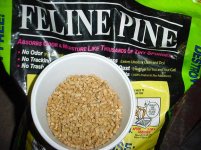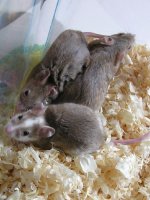Taceas
USW = UB313
Having 3 colonies of mice set up is really making that mousey odor rather apparent. =(
They are currently housed in glass aquariums with metal screened lids. I'm using aspen for the litter and feeding a custom blended block type diet. I clean their cages out weekly and add Arm & Hammer Cat Litter Powder to the bottom before I refill it with aspen, and it seems to have helped the smell but not enough for me.
I'm curious to know if any of you folks who breed more mice than me have come across anything you can add to their diet or water that minimizes odors rather well.
I've heard several people recommend adding vanilla to their water bottles. Imitation vanilla or pure vanilla (kinda pricey)? How much? And are you in any way concerned that both vanilla sources contain a good quantity of alcohol? Alcohol has been shown in several studies of both mice and humans that it can affect fetal development adversely.
I've used a product in the past for my ferret that neutralizes urine and feces odor within the body. How it does it I don't know, I'm not a chemist. It's called Marshall Ferret Bi-Odor Ferret Deoderizer and it comes in a variety of bottle sizes and it helps tremendously lower the amount of "bathroom smell" my ferret puts out. You simply add a couple of squirts to their water bottle and after a week you notice the smell significantly reduced. I've been thinking of trying it with my mice here lately.
I've used it on rats, rabbits, and guinea pigs successfully and it reduced the tell-tale urine smell quite well, so I really see no point in not trying it with mice. My only qualm about it is that it isn't cheap by any means. If I do decide to try it again, I'll let you know how it goes. They even have a catnip flavored version for use in cats. =P
Anyway let me know what you all use.
They are currently housed in glass aquariums with metal screened lids. I'm using aspen for the litter and feeding a custom blended block type diet. I clean their cages out weekly and add Arm & Hammer Cat Litter Powder to the bottom before I refill it with aspen, and it seems to have helped the smell but not enough for me.
I'm curious to know if any of you folks who breed more mice than me have come across anything you can add to their diet or water that minimizes odors rather well.
I've heard several people recommend adding vanilla to their water bottles. Imitation vanilla or pure vanilla (kinda pricey)? How much? And are you in any way concerned that both vanilla sources contain a good quantity of alcohol? Alcohol has been shown in several studies of both mice and humans that it can affect fetal development adversely.
I've used a product in the past for my ferret that neutralizes urine and feces odor within the body. How it does it I don't know, I'm not a chemist. It's called Marshall Ferret Bi-Odor Ferret Deoderizer and it comes in a variety of bottle sizes and it helps tremendously lower the amount of "bathroom smell" my ferret puts out. You simply add a couple of squirts to their water bottle and after a week you notice the smell significantly reduced. I've been thinking of trying it with my mice here lately.
I've used it on rats, rabbits, and guinea pigs successfully and it reduced the tell-tale urine smell quite well, so I really see no point in not trying it with mice. My only qualm about it is that it isn't cheap by any means. If I do decide to try it again, I'll let you know how it goes. They even have a catnip flavored version for use in cats. =P
Anyway let me know what you all use.


